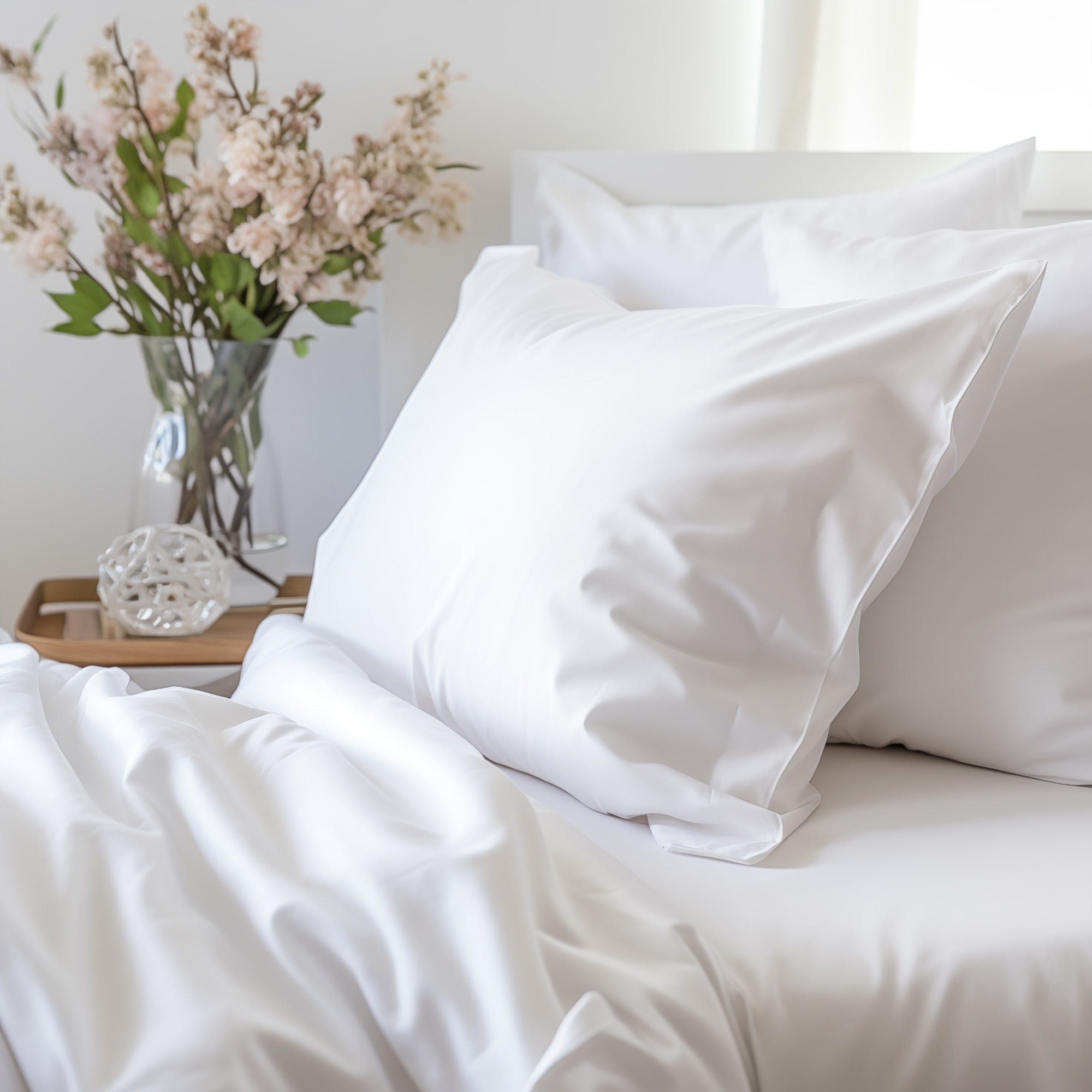Imagine sliding into a bed covered in sheets that are not just incredibly soft but also eco-friendly. That’s the double win you get with bamboo bed sheets. To maintain their quality, it’s crucial to follow proper bamboo sheet care, such as avoiding fabric softeners and using gentle cycles.
However, to preserve the unique feel and sustainable benefits of your sheets, you need to know how to wash bamboo sheets the right way. Incorrect cleaning methods can compromise their quality, depriving you of the comfort and sustainability they offer.
Continue reading to find out how to make your bamboo sheets stay in perfect condition.
Why Bamboo Sheets Need Special Care
The Unique Properties of Bamboo Fabric

Bamboo fabric is a soft, breathable, and sustainable material. Thanks to bamboo fibers, these sheets are incredibly absorbent and thermally regulating, perfect for both hot and cold sleepers. With proper care, premium quality bamboo sheets pill less than traditional cotton sheets. Pilling can occur due to washing at high temperatures, using harsh detergents, or subjecting the sheets to abrasion, as well as from regular tossing and turning at night.
Importance of Proper Washing to Extend the Lifespan of Your Sheets
To make sure you get the best out of your bamboo bed sheets, proper washing techniques are critical. Casual or improper washing can lead to frayed fibers, faded colors, and reduced lifespan. Not to mention, the quality of your sleep might take a hit.
The Environmental Angle
Let’s not forget the ecological benefits of bamboo as a material. This fast-growing plant is a renewable source that has a smaller carbon footprint compared to other fabric materials. Properly maintaining your bamboo sheets doesn’t just benefit you; it means fewer replacements and less waste, which is good for the planet.
Can Bamboo Sheets be Washed Regularly?
Yes, you can and should wash your bamboo sheets regularly to keep them fresh and hygienic. While bamboo fabric is naturally resistant to bacteria and odors, it’s not entirely self-cleaning.
Avoid using hot water when washing bamboo sheets, as it can cause excessive shrinking and damage to the fabric. Instead, use warm water for proper care and longevity of the sheets.
Washing your sheets every week or every other week is a good rule of thumb. The aim here is not just to get rid of superficial dirt or stains, but also to maintain the integrity of your sheets.
Some people believe that bamboo sheets should be washed less often due to their delicate nature, but that’s not entirely accurate. While it’s true that bamboo fabric requires gentler care compared to other materials like cotton, regular washing is still essential for cleanliness and longevity. The key is to follow the appropriate steps, which we’ll get into shortly.
Preparing to Wash Bamboo Sheets
Before tossing your bamboo bed sheets into the washing machine, there are a few preparatory steps you should consider to ensure that you’re doing it the right way.
Sorting Laundry and Reading Care Labels
First off, separate your bamboo sheets from other types of laundry. The unique bamboo fibers require a gentler washing cycle, and mixing them with more robust fabrics like denim can cause unnecessary wear and tear.
Also, it’s crucial to read the care labels or any manufacturer instructions that come with your sheets. These labels often contain specific information tailored to your particular sheets’ needs.
Necessary Washing Supplies
Once you’ve sorted your laundry and read any care labels, make sure you have all the supplies you’ll need. This typically includes a mild detergent formulated for delicate fabrics. Also, while fabric softeners might seem like a good idea, they can actually leave a residue on bamboo fabric that may reduce its natural breathability. Opt for white vinegar as a natural fabric softener if needed. Additionally, using gentle detergents and avoiding hot water can help ensure that bamboo sheets will not pill.
When to Wash
As mentioned earlier, it’s a good practice to wash your bamboo sheets every week or every other week. This frequency ensures they remain hygienic without putting too much wear and tear on the fabric. However, if you sweat excessively or if the sheets get soiled, an immediate wash is advisable.
Washing Bamboo Sheets: Step-by-Step Guide

Washing bamboo bed sheets may require a bit more attention to detail than your average load of laundry. Still, the benefits—long-lasting cooling sensation, durability, and eco-friendliness—are well worth it. Here’s how to wash bamboo bed sheets effectively:
Pre-Wash Treatment
If your sheets have specific stains, treat them with a gentle stain remover before you start the washing process. Be sure to avoid bleach or any harsh chemicals, as these can damage the sheets’ fibers.
Machine vs. Hand Washing
Machine Washing
- Load the Washer: Place your bamboo sheets in a washing machine without overcrowding. Too many items can lead to twisting and pulling, damaging the sheets.
- Select Settings: Use a cold or warm water setting. Avoid hot water as it can cause excessive shrinking and damage to the bamboo fibers.
- Add Detergent: Add a mild detergent suitable for delicate fabrics. A little goes a long way.
- Start Washing: Run the washer on a gentle cycle.
- Extra Rinse: Consider an extra rinse cycle to ensure all detergent gets washed away.
Hand Washing
- Fill Basin: Fill a sink or basin with cold to lukewarm water.
- Add Detergent: Mix in a cupful of mild detergent.
- Soak and Agitate: Place your sheets in the water and gently agitate. Let them soak for 15-30 minutes.
- Rinse: Rinse thoroughly in cold water to remove detergent.
Drying Bamboo Sheets
When it comes to drying, you have a couple of options. You can dry bamboo sheets by air-drying, machine drying, or hanging them outside in warm weather. Air drying is the most gentle method and helps maintain the integrity of your bamboo bed sheets. If you must use a machine, opt for a low-heat, tumble dry setting. Remove the sheets promptly to reduce wrinkling.
Common Mistakes to Avoid
Even with the best intentions, it’s easy to make a mistake when washing your bamboo bed sheets. Let’s go over some common errors to avoid.
Wrong Detergents and Additives
The first and foremost mistake that many make is using the wrong kind of detergents and fabric softeners. Harsh cleaning agents can be damaging and compromise the integrity of the sheets. Stick to mild detergents, and avoid bleach and fabric softeners, which contain chemicals too harsh for delicate bamboo fabric.
Overloading the Washing Machine
It might seem efficient to wash all your bedding at once, but overloading your washing machine can lead to problems. Sheets need room to move freely, so they’re adequately cleaned and rinsed. Overcrowding can cause the sheets to twist, which can damage the fibers and also lead to incomplete cleaning.
Ignoring Care Labels
Never underestimate the importance of the care label attached to your bamboo sheets. These guidelines are based on thorough testing by the manufacturer and offer invaluable advice on how to extend the lifespan of your bedding. Ignoring these can result in color fading, fiber weakening, and reduced comfort.
High Heat Drying
Though you might be tempted to use a high heat setting to dry your sheets faster, this is a big no-no. High heat can cause bamboo fabric to weaken and shrink. Always opt for air drying or a low-heat tumble dry setting. Bamboo sheets wrinkle naturally, so to address wrinkles, consider air drying the bedding and ironing it on a low-steam setting.
Additional Tips for Longevity
Aside from washing, there are other ways you can extend the lifespan of your bamboo bed sheets. A little extra care can go a long way in maintaining the comfort and quality you fell in love with initially.
Storage Tips
Where and how you store your sheets can make a difference. Keep your bamboo sheets in a cool, dry place away from direct sunlight. If possible, use breathable cotton bags rather than plastic, as plastic can trap moisture and lead to mildew.
Seasonal Care
While bamboo sheets are known for their ability to regulate temperature, you may find that they require different care during the colder months. Using a mild, natural fabric softener can help keep them from getting too stiff when the air is dry. To whiten bamboo sheets, consider using white vinegar, lemon juice, baking soda, or non-chlorine bleach instead of chlorine bleach to avoid fabric damage.
The Pillows and Pillow Cases
Don’t forget about the pillows and pillow cases that came with your bamboo bed sheets. They need the same level of care as the sheets themselves. Make sure you’re not neglecting them when it comes to washing and storing.
Avoid Ironing
You may be tempted to iron bamboo sheets for that crisp, hotel-like feel, but resist the urge. Bamboo fabric is delicate and can be damaged by the high heat of an iron. If you must, use a low-heat setting and a cloth barrier between the iron and the sheet.
Rotate Your Sheets
A simple but effective way to extend the lifespan of your sheets is by rotating them regularly. If you have more than one set, swap them out every week or two. This reduces wear and tear on a single set, helping each last longer.
Find Your Perfect Bamboo Sheets at Earthly Threads
Understanding how to properly care for your bamboo bedding is essential for maximizing their lifespan and retaining the qualities that make them a preferred choice for the eco-conscious consumer. From washing to drying, and even storing, every step counts when it comes to prolonging the life of your bamboo fabric.
Here at Earthly Threads, we take pride in offering a wide range of sustainable and eco-friendly bamboo products, all designed with your comfort and the planet’s wellbeing in mind. When you purchase from us, you’re not just buying sheets; you’re investing in a lifestyle choice that honors the earth.
We invite you to browse our catalog of bamboo bed sheets and pajamas, and if you have any questions, you can contact our team for help. We’re here to make your transition to a greener lifestyle as smooth as possible.


